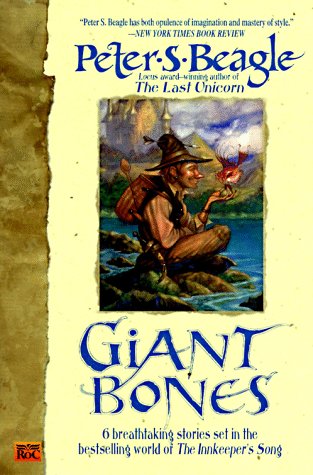Giant Bones

Peter S. Beagle, Giant Bones. New York: Roc/Penguin Books, 1997. ISBN 0-451-45651-3, $11.95, trade paperback, 269 pp.
Reprinted from the March 1998 issue of Mythprint (Volume 35:3, Whole No. 192).
Reviewed by Matt Fisher
Peter Beagle opens the Foreword to this collection of novellas with the unambiguous statement “I don’t write sequels.” He continues by writing that he never thought of writing epic trilogies that ape Tolkien, that every one of his novels is intended to be as different from each other as possible. Then, on the second page, Beagle confesses that the world he created with The Innkeeper’s Song wouldn’t let go of him. He has come back, to explore what other stories from this imaginary land were waiting to be told. Although usually I don’t want individuals to experience loneliness after finishing something important to them, I’m glad that Beagle felt the way he did. Giant Bones is the wonderful outcome of his return visit. Set in the nameless world of The Innkeeper’s Song, this collection of stories is an independent work and doesn’t require familiarity with the earlier novel. In fact, only one tale — “Lal and Soukyan” — involves characters from the novel; this story is quite enjoyable even without re-reading the earlier work.
I want to emphasize that these are stories. “The Last Song of Sirit Byar” is narrated by the female companion to the celebrated bard, telling her story to some nameless scribe she finds at the market so that it will finally be written down. The title story is told late one night by a father to his son, complete with the frustration that must inevitably ensue when the boy interrupts, cries, or in some other manner irritates his father. Other stories have different frames, but all (even the one that utilize a third person narrator) share the common feeling of being told one person to another, whether sharing a meal in a tavern or sitting by the side of the road. As with all stories that are told “orally”, there are details that are omitted, descriptions that are sparse, parts of the plot that are quickly glossed over. But it doesn’t matter; we are swept up in the rhythm, the informal intimacy, and the joy of hearing a well told story.
What are these stories about? At one level, many of them are standard plots found in many other folktales and works of fantasy: the imprisoned daughter who must be rescued, the reluctant mage who must find a way to avoid serving the unscrupulous ruler of a kingdom, the poor innocents who get tangled up in the plots of royal offspring who are each seeking sole rule of the kingdom. In this respect, there is little that is new in Giant Bones.
But it isn’t novel plots or unusual characters that caught my attention and kept me reading the collection. It is the incredible humanity of the characters and the obvious love that Beagle has for all of them. Much of the generic fantasy that I’ve come across in the past few years seems populated with characters who are princes, wizards, or saviors foretold a 1000 years before. Naturally, the fate of the entire kingdom is at stake and will depend on the decisions of these noble individuals. In contrast, Beagle writes about “ordinary” people: a poor girl carried off to marry a king, a traveling troupe of actors, an old mercenary who is trying to settle down for the last years of her life, an itinerant tinker who decides to cross a mountain range in order to find a better life. At one level, I felt that Beagle was writing about people like the ones that I have contact with on a daily basis. Yet he manages to let his characters shine in such a way that I felt that I was watching some of the nobler aspects of the human spirit. There is a maturity in these stories that is, sadly, often lacking from a lot of fantasy published today. As with any collection of shorter works, some are more successful than others. But the understanding of the human heart and spirit that Beagle shows in several of these stories, coupled with the affectionate and “sentimental” tone of his writing, results in a powerful and moving experience for the reader.
Giant Bones isn’t a collection that is worth reading for its novelty or the ground it breaks in modern fantasy. It’s not a work that I see achieving the status of the Earthsea series or John Crowley’s Little, Big. But make no mistake; Giant Bones is well worth reading and I strongly recommend it. Read it to be reminded of the possibilities of the human heart, and to hear these stories told by an author who is clearly and deeply in love with his characters. I savored each one of these stories, and found myself thinking about the characters long after I had put the book down for the night.
